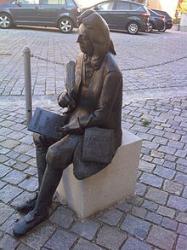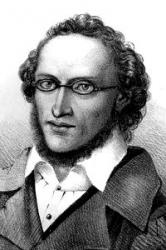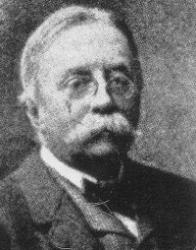Planning worship?
Check out our sister site, ZeteoSearch.org,
for 20+ additional resources related to your search.
- |
User Links
Person Results
George J. Elvey

1816 - 1893 Person Name: G. J. Elvey Composer of "[What various hindrances we meet]" in Hymns of Zion George Job Elvey (b. Canterbury, England, 1816; d. Windlesham, Surrey, England, 1893) As a young boy, Elvey was a chorister in Canterbury Cathedral. Living and studying with his brother Stephen, he was educated at Oxford and at the Royal Academy of Music. At age nineteen Elvey became organist and master of the boys' choir at St. George Chapel, Windsor, where he remained until his retirement in 1882. He was frequently called upon to provide music for royal ceremonies such as Princess Louise's wedding in 1871 (after which he was knighted). Elvey also composed hymn tunes, anthems, oratorios, and service music.
Bert Polman
George J. Elvey
Gioacchino A. Rossini
1792 - 1868 Person Name: Gioachino A. Rossini Composer of "LINWOOD" in The Methodist Hymnal Gioacchino A. Rossini; b. 1792, Pesaro; d. 1868, Ruelle near Parise
Evangelical Lutheran Hymnal, 1908
Gioacchino A. Rossini
Christian Knorr von Rosenroth

1636 - 1689 Person Name: Christian Knorr von Rosenroth Composer of "CONTRITION" in Hymns to the Living God Knorr, Christian, Baron von Rosenroth, son of Abraham Knorr yon Rosenroth, pastor at Altrauden in Silesia, was born at Altrauden, July 15, 1636. After studying at the Universities of Leipzig (where he graduated M.A. 1659, along with J. B. Carpzov, the famous Orientalist) and Wittenberg, he made an extended tour through France, England, and Holland. At Amsterdam he became acquainted with an Armenian prince, with the chief Rabbi, Meier Stern, from Frankfurt-am-Main, with Dr. John Lightfoot, Dr. Henry More, and others, and as the result of intercourse with them, devoted himself to the study of the Oriental languages, of chemistry, and of the cabalistic sciences. For his learning in these departments he was taken into the service of the like-minded Palsgrave Christian August of Sulzbach, who in 1668 appointed him Geheimrath and prime minister (Kanzlei-director). He was created Baron von Rosenroth by the Emperor Leopold I. in 1677, and died at Sulzbach (near Amberg, Bavaria), May 8, 1689, it is said at the hour he had himself predicted. (Wetzel, ii. 43, and A. H., ii. 444; Hömer's Nachrichten von Liederdichtern, Schwabach, 1775, p. 142, &c.)
Knorr edited various Rabbinical writings, published various cabalistic works (e.g. his Kabbala denudata, 2 vols., Sulzbach, 1677), and was one of the seekers after the philosopher's stone. His hymns appeared as Neuer Helicon mit seiner Neun Musen, das ist: Geistliche Sitten-Lieder, &c. Nurnberg, 1684 [Hamburg Library], a work containing 70 hymns mostly flowing in expression and metre. Of these 12 are poetic versions from Boethius's De Consolatione Philosophiae, 8 are from Latin hymns, and 8 are recasts of older German hymns. Sixteen of his hymns were included by Freylinghausen in his Gesang-Buch, 1704 and 1714. Koch speaks of them not unjustly as "truly pious and spiritual," as "of genuine poetical elevation and glowing desire after inner union with Christ," and as the fruits of a "noble and chastely earnest mysticism."
Two of Knorr's hymns have passed into English. One is a translation of "Ad coenam Agni" (p. 12 ii.). The other is
Morgenglanz der Ewigkeit. Morning. This fine hymn appeared, 1684, as above, p. 159, in 7 st. of 6 1., entitled " Morning Prayer," and is included in the Berlin G. L. 8., ed. 1863, No. 1121. It is based on a hymn by M. Opitz, but is more happily expressed, and has attained much greater popularity. Fischer, ii. 94, speaks of it as "one of the freshest, most original, and spirited of Morning Hymns, as if born from the dew of the sunrise." In all the translations in common use, st. ii., v. are omitted. Translated as:—
1. Light of heaven's eternal day! A good translation by A. T. Russell, as No. 68 in the Dalston Hospital Hymn Book, 1848, repeated in his own Psalms & Hymns, 1851, and the Cheltenham College Hymn Book, 1866.
2. Dayspring of Eternity! Dawn on us this morning-tide. A good translation by Miss Winkworth in her Lyra Germanica, 1st Ser., 1855, p. 219. In full in the Hymnal for St. John's, Aberdeen, 1870, and E. Courtauld's Psalms, Hymns & Anthems, 1860; and abridged in Hymns of the Spirit Boston, U. S., 1864, Dr. Martineau's Hymns, 1873, and others.
3. Jesus, Sun of Righteousness. A good but rather free translation by Miss Borthwick, in Hymns from the Land of Luther, 2nd Ser., 1855, p. 23 (1884, p. 88), included in the Hymnal Companion, 1876; Evangelical Union Hymnal, 1878; Church Praise, 1883, &c.; and in America in the Sabbath Hymn Book, 1858; Pennsylvania Lutheran Church Book, 1868, and others. In E. T. Prust's Supplemental Hymn Book, 1869, Baptist Hymnal, 1879, and others, 1 l. 5, 6 of each st. are omitted. In Hatfield's Church Hymn Book, N. Y., 1872, Hymns & Songs of Praise, N. Y., 1874, and others, it is rewritten to 6 lines of 7's.
4. Come, Thou bright And morning star. A good translation contributed by R. Massie to the 1857 ed. of Mercer's The Church Psalter & Hymnbook., No. 502 (Ox. ed. 1864, No. 1), and in his own Lyra Domestica, 18&4, p. 136. Repeated in R. Minton Taylor's Hymnal, 1872, No. 42; Marlborough College Hymn Book, 1869 ; Rugby School Hymn Book, 1876, and others.
5. Sun of heaven's eternal day. A good translation contributed by Dr. John Ker to the United Presbyterian Juvenile Mission Magazine, 1858, p. 73; repeated in the Ibrox Hymnal 1871.
6. Dayspring of Eternity, Light of uncreated tight. By Dr. B. H. Kennedy, as No. 824 in his Hymnologia Christiana, 1863.
7. Dayspring of Eternity! Hide no more thy radiant dawning. A good translation by Miss Winkworth (based on her 1855 version), as No. 159 in her Chorale Book for England, 1863. Repeated in R. Minton Taylor's Hymnal, 1872, No. 43, and the Book of Church Praise, 1865 (Bosworth).
8. Dayspring of Eternity, Brightness of the Father's glory. A good but free translation by J. H. Hopkins, first published in Dr. Walter's Chorals & Hymns, 1866, and then in his own Carols, Hymns & Songs, 1882, p. 145. Included in the Hymns & Songs of Praise, N. Y., 1874.
9. Dayspring of Eternity, Brightness of the Light divine. In Brown-Borthwick's Select Hymns, 1871, and Church Hymns, 1871, compiled mainly from the translations by Miss Winkworth an« Miss Borthwick, but partly from Dr. Kennedy and Mr. Russell. Thence in J. L. Porter's Collection, 1876, and the Psalmist, 1878.
10. Dayspring of eternal day. A good translation by Edward Thring, contributed to the Uppingham and Sherborne School Hymn Book, 1874, No. 5.
Other trs. are: (1) "Day-dawn of Eternity," by H. J. Buckoll, 1842, p. 35. (2) "Daystar from Eternity," in J. Sheppard's Foreign Sacred Lyre, 1857, p. 84. (3) and Reid's Praise Book, 1812, No. 404. [Rev. J. Mearns, M.A.]
-- John Julian, Dictionary of Hymnology (1907)
=====================
Knorr, Christian, Baron von Rosenroth, p. 620, i. E. Thring's translation of "Morgenglanz der Ewigkeit" (p. 630, i. 10), is altered in the Sherborne School Hymn Book, 1888, to "Day spring of Eternity, Light from depths of light unending."
--John Julian, Dictionary of Hymnology, Appendix, Part II (1907)
Christian Knorr von Rosenroth
Joseph Mainzer

1801 - 1851 Person Name: Dr. Mainzer Composer of "[What various hindrances we meet]" in Songs of Victory Abbe Joseph Mainzer, b. Trier, 1807; d. Mancehster, 1851
Evangelical Lutheran Hymnal,
======================
Born: October 21, 1801, Trier, Germany.
Died: November 10, 1851, Higher Broughton (near Manchester), England.
Mainzer was educated at the Maîtrise of Trier Cathedral. Having studied engineering, he worked in mines at Saarbrücken, but was ordained in 1826 and after a few years became an abbé. He left Germany in 1833 for political reasons, settling in Brussels, then Paris, and Britain in 1839, living first in Edinburgh, then, after 1847, in Manchester. He published the Musical Times and Singing Circular. Novello took over the publication in 1844, renaming it the Musical Times.
Sources:
Pratt, p. 622
http://www.hymntime.com/tch/bio/m/a/i/mainzer_j.htm
=====================
http://en.wikisource.org/wiki/Mainzer,_Joseph_(DNB00)
Joseph Mainzer
Henry Baker
1835 - 1910 Person Name: Henry Baker, 1835-1910 Composer of "QUEBEC" in African Methodist Episcopal Church Hymnal Henry Baker, Mus. Bac., son of the Rev. James Baker, Chancellor of the diocese of Durham; born at Nuneham, Oxfordshire; educated at Winchester School; graduated Bachelor in Music at the University of Oxford in 1867. He also worked as a civil engineer.
Scottish Church Music, its composers and sources by James Love; William Blackwwod and Sons, Edinburgh and London, 1891
Henry Baker
William Mason

1829 - 1908 Person Name: W. Mason Composer of "OLA" in Book of Worship Born: January 24, 1829, Boston, Massachusetts.
Died: July 14, 1908, New York City.
Third son of Lowell Mason, William studied piano in Boston, then went abroad, becoming acquainted with Liszt in Weimar, Germany. He returned to America in 1854 and made a tour as a concert pianist. He later settled in New York City, in 1868 began teaching piano. During his life, he wrote about 10 hymn tunes, and some 40 piano pieces.
Sources:
Jones, pp. 90-93
Hughes, p. 485
http://www.hymntime.com/tch/bio/m/a/s/mason_w.htm
======================
William Mason
W. T. Dale

1845 - 1924 Composer of "[What various hindrances we meet]" in Times of Refreshing
W. T. Dale
P. P. Van Arsdale
Composer of "[What various hindrances we meet]" in Chapel Melodies
P. P. Van Arsdale
William Boyd
1847 - 1928 Composer of "PENTECOST" in The A.M.E. Zion Hymnal William Boyd Jamaica 1847-1928. Born at Montego Bay, he studied under Sabine-Baring Gould, and attended Worcester College,Oxford. He was ordained an Anglican priest in 1877, eventually becoming Vicar at All Saints Church, Norfolk Square, London.
John Perry
William Boyd


 My Starred Hymns
My Starred Hymns


